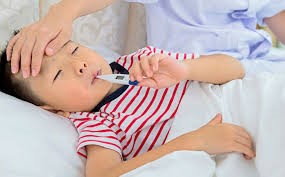Dengue Fever:
A mild dengue fever, which causes high fever, rashes, headache, and muscle and joint pain can develop into a severe dengue fever. A serious form of dengue is also referred to as dengue hemorrhagic fever, which causes a sudden drop in the blood pressure to a hazardous level, shock, and in a few cases can cause the death of a patient. Therefore, as and when the symptoms appear, immediately consult your doctor before it reaches the dangerous stage.
Dengue fever is a mosquito-borne infection caused by the dengue virus. When the female Aedes mosquito bites a person, they may not show the symptoms immediately. It generally takes 4 to 7 days before any sign or symptoms appear. This phase is called the incubation period. After the incubation period, there are 3 phases of dengue infection:
1.Febrile phase:
This phase begins when the patients usually develop high-grade fever unexpectedly. This severe febrile phase generally lasts 2–7 days and along with other signs such as facial flushing, nausea, sore throat, skin erythema, body ache, anorexia, myalgia, arthralgia, and severe headache. It gets very difficult for the patient to carry out routine functions such as going to the office or school, household chores, etc.
2.Critical phase:
The critical phase usually starts around the time of defervescence and generally lasts 2 to 4 days. During this phase, a person may suffer from substantial plasma leakage and an increase in capillary permeability. A patient may suffer from severe abdominal pain due to fluid deposits, persisting vomiting, hemorrhages in the mucose tissues. Once a patient experiences shock, then he is categorized as suffering from DSS i.e. Dengue Shock Syndrome.
3.Convalescent phase:
The dengue fever is usually limited and is seldom fatal. Once the plasma leakage recedes, the patient reaches the convalescent phase and begins to reabsorb the extravascular fluid and pleural and abdominal effusions. This phase lasts for weeks and maybe lined with depression and weakness, particularly in adults. There are no permanent aftereffects related to this infection.
If you or anyone in the family has symptoms such as high fever, severe headache, continuous vomiting, joint pain, and rash, etc., consult our team of health care experts at the Bansal Global Hospital. An early diagnosis is very essential to fight the infection, otherwise, the condition of the patient can get very serious. We at Bansal Global Hospital have a team of specialized physicians who focuses on complete and integrated health care with a compassionate atmosphere.
Contact us at +919911062832


 MAKE AN APPOINTMENT
MAKE AN APPOINTMENT